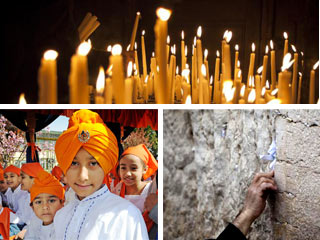 Jains around the world celebrate Mahavir Jayanti, their most important religious festival.
Jains around the world celebrate Mahavir Jayanti, their most important religious festival.
Sikhs also observe one of their most important holidays, Vaisakhi, a spring harvest festival. Many Hindus also observe Vaisakhi as a time of renewal and rebirth.
For the world’s more than two billion Christians, this coming week is Holy Week. Most years, because of their different calendars, Eastern Orthodox and Western Christians observe the events of Holy Week on different days. But this year, it’s the same for all.
The week begins with Palm Sunday. On that day, according to New Testament accounts, Jesus entered Jerusalem riding on a donkey and was greeted by crowds waving palm fronds. They welcomed him as a conquering hero, there to overthrow Roman rule. Churches commemorate the day with their own Palm Sunday processions.
As the week continues, the mood becomes increasingly somber. On Holy Thursday, Christians remember the Last Supper or the final meal Jesus had with his disciples, which many believe was a Passover seder. The day is also called Maundy Thursday, named for Jesus’ command to his disciples to love one another. Many clergy wash the feet of their congregants, as the Gospels say Jesus did for his disciples at the Last Supper. In some churches, members wash each other’s feet.
Good Friday is the day of the crucifixion. Many Christians follow the Stations of the Cross or carry crosses in procession, remembering Jesus’ carrying his own cross to the place where he was crucified. In Catholic and many Protestant churches, altars are stripped bare. Statues and crosses are covered to mark Jesus’s death. The shrouds remain through Holy Saturday, also a day of mourning.
Then darkness gives way to light as churches celebrate the resurrection of Jesus on Easter Sunday, or as it is called in the Eastern tradition, Pascha.
For Jews, the eight-day celebration of Passover begins at sundown Monday (April 14). This week, as is the tradition, one of Israel’s chief rabbis started Passover preparations by cleaning out notes and prayers wedged inside crevices in Jerusalem’s Western Wall. Millions of people visit Judaism’s holiest site each year, and many tuck written messages into the ancient stones. The rabbi clears them out and buries them twice a year, once just before Passover. Jews celebrate Passover with the Seder, the special meal commemorating their ancestors’ exodus from slavery in Egypt. The Exodus story tells how God punished the Egyptians by killing their first-born sons. But his angel passed over the homes of the Jews, which were marked with lamb’s blood. Every element of the Seder symbolizes part of the story, and the book that guides the ritual is the haggadah.

